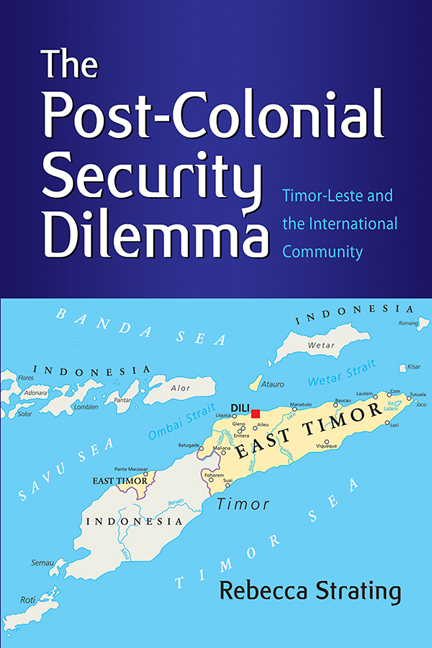Book contents
- Frontmatter
- Contents
- List of Tables
- Acknowledgements
- 1 Introduction
- 2 The Struggle for Recognition: Territorialization, Self-determination and the Imagining of “East Timor”
- 3 The Politics of Recognition: East Timor and the International Community
- 4 Establishing Legitimacy: International State-building in East Timor
- 5 Timor-Leste's Aspirational Foreign Policy
- 6 Identity Hedging: Timor-Leste's Engagement with Intergovernmental Organizations
- 7 Timor-Leste's National Security Agenda
- 8 Securing Economic Sovereignty
- 9 International Reconciliation and Transitional Justice
- 10 Conclusion: Timor-Leste in the Changing Regional Order
- Postscript
- Bibliography
- Index
- About the Author
6 - Identity Hedging: Timor-Leste's Engagement with Intergovernmental Organizations
Published online by Cambridge University Press: 16 May 2019
- Frontmatter
- Contents
- List of Tables
- Acknowledgements
- 1 Introduction
- 2 The Struggle for Recognition: Territorialization, Self-determination and the Imagining of “East Timor”
- 3 The Politics of Recognition: East Timor and the International Community
- 4 Establishing Legitimacy: International State-building in East Timor
- 5 Timor-Leste's Aspirational Foreign Policy
- 6 Identity Hedging: Timor-Leste's Engagement with Intergovernmental Organizations
- 7 Timor-Leste's National Security Agenda
- 8 Securing Economic Sovereignty
- 9 International Reconciliation and Transitional Justice
- 10 Conclusion: Timor-Leste in the Changing Regional Order
- Postscript
- Bibliography
- Index
- About the Author
Summary
As a small new state, one of Timor-Leste's initial foreign policy priorities was to strategically position itself within the international community. The term “hedging” typically refers to ways small and medium states employ policies of balancing and engagement in their relations with powerful states. Hedging acts as an “insurance policy” as states “cultivate a middle position that forestalls or avoids having to choose one side… at the obvious expense of another”. In its engagements with multilateral regional and cultural associations, Timor-Leste has employed a form of “identity hedging” as it has diversified its relationships and sought to avoid dependence on any one state or bloc. Small states, such as Timor-Leste, use multilateral engagements as a way of maximizing their strategic options in international relations. According to declaratory policy, Timor-Leste considers its geographical position as “highly strategic” and views the protection of its natural resource wealth and security as dependent upon “maintaining good relationships with our neighbours and friends”. This chapter focuses on Timor-Leste's engagements with intergovernmental regional and cultural associations. Upon independence, Timor-Leste aspired to join as many multilateral organizations as possible.
As highlighted in chapter two, Timor-Leste's leaders have emphasized its cultural distinctiveness arising from centuries of migration and occupation, and its geographical location in the “transition zone” between Southeast Asia to the west and Oceania to the east. During his Nobel Peace Prize acceptance speech, José Ramos-Horta argued that, “East Timor is at the crossroads of three major cultures: Melanesian, which binds us to our brothers and sisters of the South Pacific Region; Malay-Polynesian binding us to Southeast Asia; and the Latin Catholic influence, a legacy of almost 500 years of Portuguese colonisation.” He argued that Timor-Leste would retain close ties with Portugal and seek membership in the Association of Southeast Asian Nations (ASEAN) and South Pacific Forum “within days” of independence because Timorese leaders were conscious of the need to “co-exist” with its eastern and western neighbours. In a 2014 speech, Xanana Gusmão also emphasized the importance of Timor-Leste's geopolitical positioning in “creating bridges with Europe, Africa and Latin America”. This cultural distinctiveness is viewed by leaders as providing Timor-Leste opportunities to facilitate unique relationships between and across different states and regional associations. It also reflects the ways in which collective identity formation is not “organic” but a consequence of choices made by leaders as they interpret the best interests of the state.
- Type
- Chapter
- Information
- The Post-Colonial Security DilemmaTimor-Leste and the International Community, pp. 161 - 198Publisher: ISEAS–Yusof Ishak InstitutePrint publication year: 2018



